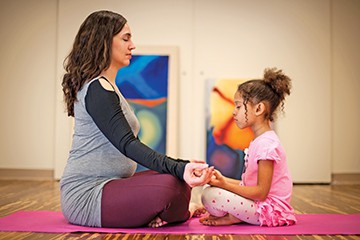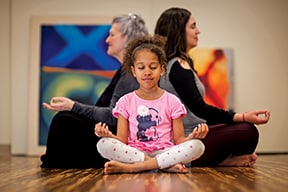ONE FAMILY SHARES ITS TRADITION OF WELLNESS WITH 100 OTHERS
STORY BY Brandie Jefferson PHOTOGRAPHY BY André Chung
Jade Connelly-Duggan’s 6-year-old daughter, Rianna, was throwing a temper tantrum, as 6-year-olds do sometimes. But this time, Jade didn’t have the patience to deal with it, so she just went back to cooking, ignoring the girl’s meltdown. “Then I turned around and saw her meditating.”
Connelly-Duggan didn’t ask her to do it. “It’s not punishment in our house,” she said with a laugh, sitting in a sparsely decorated practitioners room at her wellness practice. “She just knew.”
practitioners room at her wellness practice. “She just knew.”
That’s because knowledge of “wellness” is a given in Connelly-Duggan’s family. In the 1970s, her parents, Robert Duggan and Dianne Connelly began the College of Chinese Acupuncture, which grew into the Tai Sofia Institute – which, as of March 1 became the accredited Maryland University of Integrative Health, where Bob remains president emeritus and Dianne chancellor emeritus.
Connelly-Duggan has followed in her parents’ footsteps; she is the founder and owner of WisdomWell, a center for family wellness where she works with her mother and father. Through a new program, 100 Well Families, Connelly-Duggan is on a mission to share the knowledge her family takes for granted to 100 families, and beyond.
As of early spring, the program was in its pilot stage; Connelly-Duggan and several practitioners had started working with about 20 families to teach them how to establish and maintain ‘wellness’ in their daily lives.
Connelly-Duggan sought people that she knew from her practice that she thought might be interested in the program and settled on four families. Each family pays $80; they all get together once a month and learn about different aspects of wellness – communication, cooking, health and more – from Connelly-Duggan and from each other.
In her own life, Connelly-Duggan says she takes her knowledge about wellness for granted – seeking to reduce stress, manage illness and communicate clearly with those around her. But not everyone has those tools. She recalls talking to one of the clients whose wife and two children had been dealing with a recurring stomach bug.
She counseled the father to use fish oil and Vitamin D, she says, supplies that are always on hand in her own household. “For a  family with kids, that’s important knowledge,” Connelly-Duggan says. She is also a second-generation acupuncturist, and at WisdomWell, she works alongside massage therapists, nutritionists, herbalists and other specialists.
family with kids, that’s important knowledge,” Connelly-Duggan says. She is also a second-generation acupuncturist, and at WisdomWell, she works alongside massage therapists, nutritionists, herbalists and other specialists.
Connelly-Duggan is sharing these professionals’ knowledge with the families she currently works with. But before the herbal remedies or the acupuncture or the craniosacral therapy, families first talk about how to chew their food; how to breathe; how to ask someone to do the dishes; how to recognize signs of stress.
“It’s so basic,” her father, Bob Duggan says.
Duggan had stopped in at the WisdomWell, where he works as a consultant, for a few minutes, and listened to his daughter describe the project – as well as their own relationship: “He is our mentor,” Connelly-Duggan says of her father.
On the surface, it might not seem as if families in Howard County would need help in the wellness department. Routinely praised as one of the best places to live, the county was ranked in March by the Robert Wood Johnson Foundation as the healthiest county in Maryland. But “health” and “wellness” are not one and the same.
“We all have that deep ‘well’ within. Regardless of our status of ‘dis-ease,'” Connelly-Duggan says. “You can be fit as a fiddle and not be well.” At the same time, she adds:
You can be dying and you can be well.” In other words, wellness is largely a function of attitude and approach.
The philosophy behind the WisdomWell approach to wellness, say Connelly- Duggan and her father, is that good health does not and cannot come from the medical establishment. Bob Duggan believes that “the answer to the national health care crisis is a recovery of these skills that all of our grandparents had.”
Recovering these “lost” skills from generations past and incorporating what she describes as “cross family communication” is an integral part of the program, says Connelly-Duggan.
In one session, an 8-year-old reminded a father – not his father – how to relax. The boy recounted an exercise he had done in school: counting backwards from 10. The little boy reminded the man that he would then be calm enough to take a few breaths. “‘Oh, I can do that,’ the father said,”Connelly-Duggan recalls.. “And I could see him getting more relaxed.” Connelly-Duggan demonstrates by shifting her own weight in the chair, going from upright and stiff, to draped along the back, her legs splayed out in front of her.
In another instance, Bob Duggan recalls with a laugh, “A husband looked at his wife and said ‘You mean, when you ask me to do something, I can decline?’ and all the couples looked at each other, wide-eyed.”
There are not too many places in modern society where families can interact in this way, says Monica Dang, a participant in the Well Families program. “Our society is so focused on the me the me the me, we don’t gather. It takes effort to gather as a family.” And the families learn from each other, she adds. “Everybody in the group is very different.”
Dang came to the program in the same way that many people do: as a family’s primary caretaker – usually a woman, Jade says – who feels that she has been trying to manage her family’s wellness on her own.
Now her goal is to pass along what she learns, Dang says. “It’s about getting this information out to my husband and my kids so that they can own it themselves.” Monica’s 12-year-old son doesn’t come to the meetings, but is open to hearing what his parents have learned in their monthly session.
Dang says her husband Chuong began attending the program for her sake, but has embraced it, “he gets a lot out of it each time,” she says. And their 4-year-old daughter attends with her parents. Just being in a group of mindful people, Dang says, is a positive experience for the little girl.
Four months into the pilot program, Connelly-Duggan says the families are beginning to make meaningful connections with each other. Ideally, she says, this group of families will take part in teaching the next group. “We’ll use teaching as a learning tool,” she says.
When she first developed the 100 Well Families idea, Connelly-Duggan was able to find more than enough willing families. She expects to have the full 100 by June or July. “Everybody wants it,” she says of wellness, “Whether they know what ‘it’ is or not.”
At first, people may be interested because there is something in particular that is bothering them – difficulty communicating with a spouse or a child. “That’s why they give themselves permission to come,” Connelly-Duggan says. But what they want – and what they get – is something broader and more basic.
“People don’t even know how to breathe,” she says, offering advice directly to me: “When you leave here, just think about your breathing. Breathe from the stomach.”
And I do. I’ve been “remembering to breathe” since I met with Connelly- Duggan. It feels circular, the way I imagine horn players breathe when they hold notes impossibly long.
It feels good.
I’ve shared that little piece of wellness knowledge with my friends and family and that’s exactly the goal for the 100 Well Families project.
“We want this to go viral,” Connelly- Duggan says. “We are hoping that these families will go home and influence another 30 families. Ideally,” she says with a smile, “We’ll be putting ourselves out of business.” *




